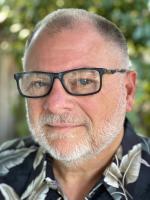We Are All Such Humans Here
The EMTs arrived moments after I let Francis tend to the chaos around her. I would have kept her on the line, but I would have felt culpable if their brood had burned down the house that she and Henry had so lovingly built. Besides, I could hear the sirens from my own emergency call as I said goodbye on my parents’ landline.
“Come in, come in,” I said to the young woman, waiting at the door in her bulky, official garb. She was so small I had to look down, as though at a child, and I had the sensation of speaking to the top of her head. “I’ve called the police, but they don’t seem to be in any kind of hurry.”
“Please,” I said and then reading the nameplate on the institutional jacket, “Constance.” I was aware of how odd it sounded, even in my own ears, such an old timey name. This was hardly a social visit, and yet I had no ready idea of how to behave. “They’re in there,” I said, pointing to the kitchen, “but I don’t think there’s anything to be done.”
“Well, we’ll see what we’ll see,” she said while outside her male partner began to slide the gurney from the back of the ambulance.
“There’s two of them,” I said. “They went together.”
“Uh, huh.”
She checked for a pulse and looked into my parents’ eyes. I could see her weighing alternatives, but in the end, she unzipped her jacket and sat at the far end of the kitchen table while I sat at the other, both of us flanked by the presence of my mother’s and father’s bodies, a faux tableau of a family meal.
She carried one of those tablet computers in a protective case, and she took what information I could give her. Names, dates of birth, doctors, health conditions, etc., etc., etc. Some sort of walkie-talkie-phone combo sat on the table and burbled nonsense while she asked questions and typed in what answers I could give her.
Meanwhile, her partner took one look and went back to their vehicle to retrieve the second gurney.
“Where do you want them transported?” she asked.
I pointed to my father’s note, still taped to the table at the place where I sat.
“Yoder’s,” I said. “Apparently, they’re expected, and their accounts are all paid up.”
“Okay,” she said.
“They have a burial plot at the cemetery in Red Bank,” I said, to which she shrugged.
Good for them,” she said, shaking her head. “It’s not that I’m not interested, I just can’t type worth a good giddy-up on this thing. And I can’t really type and have a conversation.” “I understand,” I said.
I had gone with my father when he had bought their plot, knowing that the time was near enough. It had been a broiling day in August without a breath of air, and even the shade was oppressive. In such oven air, walking outside among the rows of the dead seemed like an affront to the living. There were tombstones that dated back to the early twentieth century but no further, and my father—for reasons I couldn’t fathom—kept badgering the manager for a space in the oldest part of the cemetery until I lost my patience. “Dad,” I said, “it’s not like you’re going to know where you are, and it’s not like a social club. It’s not like there’s a better class of people with whom to be dead.”
“How do you know?” he said.
“How do you not?” I said, too stupid to make sense of it.
“And I want a stone,” he said. “None of this brass plate malarkey. I want,” he said to the manager but pointing at me, “I want his grandchildren to find us in a hundred years.”
As though he wasn’t about to count on me to remember.
Maybe I wouldn’t. Then again, he was counting on grandchildren that didn’t exist, wasn’t he?
Constance had resumed her index-finger typing, but I persisted. “I understand, I do. I can’t walk and chew gum at the same time.” And then I added, apropos of nothing: “See if you understand this: my name is Calvin, everyone calls me Fish, but my father wrote his suicide note to Cyrano. Do you understand? Do you understand what I’m saying, that I am not, and never have been, a good son?”

David Borofka is the author of Hints of His Mortality (winner of the 1996 Iowa Short Fiction Award) and a novel, The Island (MacMurray & Beck). His latest collection of stories, A Longing for Impossible Things, was released in 2022, as part of the Johns Hopkins Poetry and Fiction Series and was chosen as the winner of the American Fiction Award for the Short Story by the American Book Fest; his novel, The End of Good Intentions, was published by Fomite Press in September 2023; and a new collection of stories, The Bliss of Your Attention, will be published in 2025, once again by JHUP. David recommends the Oregon Shakespeare Festival and Reedley College Literary Arts.


